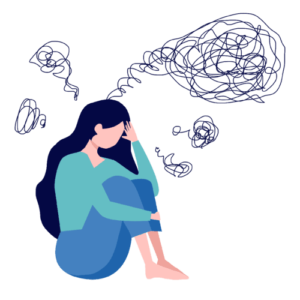
Schizophrenia Test
Answer these simple questions to understand more about your Schizophrenia. We share instant results and keep your information confidential.

What is Schizophrenia Test?
A Schizophrenia test is a diagnostic assessment used by mental health professionals to evaluate whether an individual may be experiencing symptoms indicative of schizophrenia, a complex mental disorder characterized by distorted thinking, hallucinations, delusions, and impaired social functioning. This test typically involves structured interviews, questionnaires, and observations to assess the presence and severity of these symptoms. It helps clinicians make informed diagnoses and treatment recommendations, although it’s essential to remember that only qualified healthcare providers can diagnose schizophrenia, and the test is just one part of the comprehensive evaluation process.
Who can benefit from this Schizophrenia Test?
The Schizophrenia Test can benefit individuals who suspect they may be experiencing symptoms associated with schizophrenia or those who have a family history of the disorder. It can also be valuable for mental health professionals, allowing them to assess and diagnose patients more accurately. Additionally, researchers and healthcare organizations may use such tests to gather data for studying the prevalence and characteristics of schizophrenia in different populations. Early detection and intervention are crucial in managing schizophrenia, making this test beneficial for individuals seeking clarity about their mental health and for professionals working in the field of psychiatry and psychology.


Schizophrenia Test Accuracy
The accuracy of schizophrenia tests varies widely depending on the type of test and the context in which it’s administered. Common diagnostic tools like the Structured Clinical Interview for DSM-5 (SCID) or self-report questionnaires like the Positive and Negative Syndrome Scale (PANSS) can be highly accurate when conducted by trained professionals. However, no single test is infallible, and misdiagnoses can occur due to the complexity and heterogeneity of schizophrenia symptoms. Accuracy also depends on the stage of the illness. Overall, accurate diagnosis often requires a comprehensive evaluation by mental health experts and consideration of the patient’s medical history and clinical presentation.
Types of Assessment to Measure Schizophrenia Test
Structured Clinical Interview for DSM-5 (SCID):
The SCID is a widely used diagnostic interview that follows criteria outlined in the Diagnostic and Statistical Manual of Mental Disorders, Fifth Edition (DSM-5). It helps clinicians gather information on the patient’s symptoms and history to determine if they meet the criteria for schizophrenia.
Positive and Negative Syndrome Scale (PANSS):
PANSS is a widely used tool for assessing the severity of symptoms in schizophrenia. It measures both positive symptoms (hallucinations, delusions, disorganized thinking) and negative symptoms (social withdrawal, emotional flatness, lack of motivation).
Brief Assessment of Cognition in Schizophrenia (BACS):
BACS assesses cognitive functioning in individuals with schizophrenia, including memory, attention, executive functioning, and verbal fluency.
Magnetic Resonance Imaging (MRI) and Functional MRI (fMRI):
Brain imaging techniques can help researchers and clinicians identify structural and functional abnormalities in the brains of individuals with schizophrenia.
Observation and Behavioral Assessment:
Observations of behavior and social interactions in clinical settings can provide valuable information about a person’s symptoms and functioning.
Neuropsychological Testing:
Neuropsychological tests assess cognitive and memory functioning, which can be impaired in individuals with schizophrenia.
Handling Schizophrenia
Handling schizophrenia can be challenging, both for individuals living with the condition and their loved ones. Schizophrenia is a complex mental disorder characterized by a range of symptoms, including hallucinations, delusions, disorganized thinking, and impaired social and cognitive functioning. However, with the right treatment and support, many people with schizophrenia can lead fulfilling lives. Here are some key steps to consider when handling schizophrenia:
- Seek Professional Help: If you suspect that you or someone you know may have schizophrenia, it’s essential to seek professional help promptly. A psychiatrist or mental health professional can diagnose the condition and develop a treatment plan.
- Medication: Antipsychotic medications are often the primary treatment for schizophrenia. These drugs can help alleviate the most distressing symptoms, such as hallucinations and delusions. It’s crucial to take medication as prescribed and attend regular check-ups with a healthcare provider.
- Therapy and Counseling: Psychotherapy, such as cognitive-behavioral therapy (CBT), can be beneficial in helping individuals with schizophrenia manage their symptoms, improve their coping skills, and enhance their quality of life.
- Family Support: Schizophrenia can affect not only the individual but also their family and friends. Seek support from support groups or family therapy to better understand the condition and learn how to provide effective support.
- Education: Learning about schizophrenia, its symptoms, and its treatment options can empower individuals and families to make informed decisions and reduce stigma.
- Lifestyle Management: Encourage a healthy lifestyle, including regular exercise, a balanced diet, adequate sleep, and stress management. These factors can have a positive impact on overall well-being.
- Social Support: Isolation can exacerbate schizophrenia symptoms. Encourage social interactions and activities that promote engagement with others.
- Setting Realistic Goals: Individuals with schizophrenia can still achieve their goals, but it’s essential to set realistic and manageable objectives. Break down larger goals into smaller steps.
- Monitor Symptoms: Keep track of symptoms, medication side effects, and changes in behavior. Share this information with healthcare providers to adjust the treatment plan if necessary.
- Crisis Plan: Develop a crisis plan that outlines what to do in case of a severe symptom flare-up or a crisis situation. Ensure that trusted individuals are aware of this plan.
- Legal and Financial Support: Depending on the severity of the illness, individuals with schizophrenia may need assistance with legal and financial matters. Consider establishing a power of attorney or guardianship if necessary.
- Avoid Substance Abuse: Substance abuse can worsen the symptoms of schizophrenia. Encourage individuals with schizophrenia to avoid alcohol and drugs.
It’s important to remember that schizophrenia is a treatable condition, and with the right support and treatment, many people can lead productive and fulfilling lives. Regular communication with healthcare professionals and a strong support network can make a significant difference in managing this disorder.